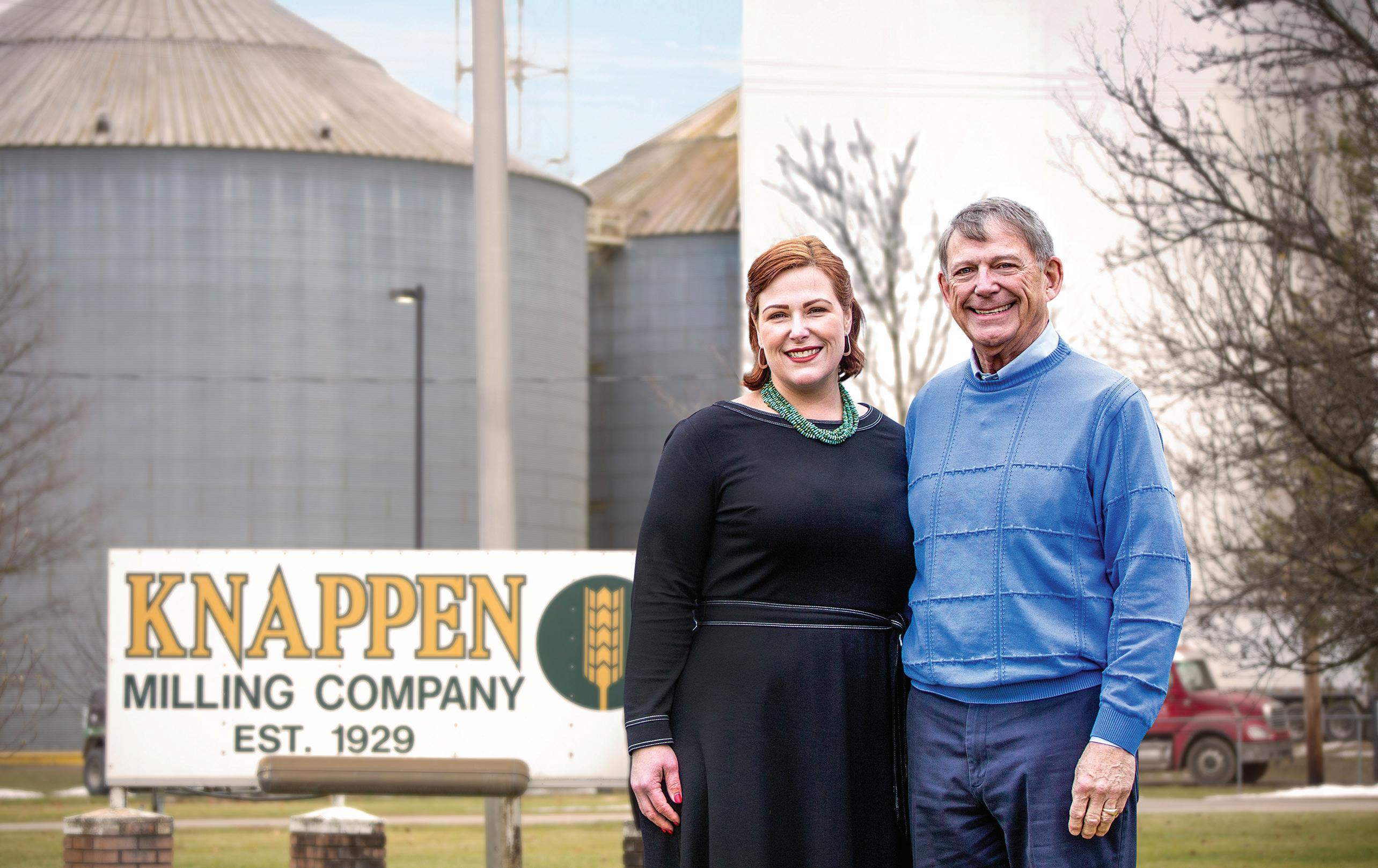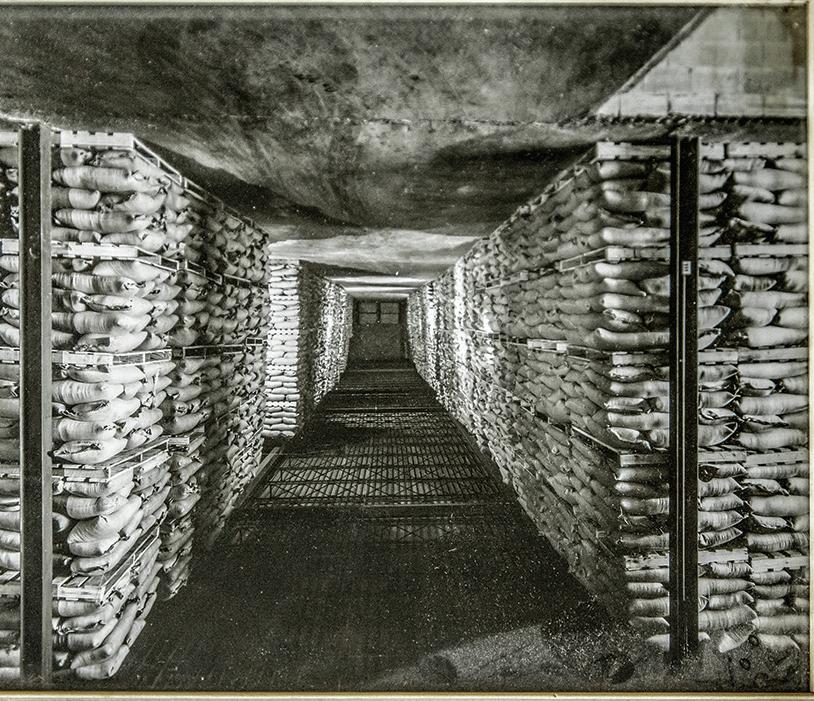
8 minute read
Enterprise
from Encore July 2020
Running the Mill Great-granddaughter blazes trail as Knappen Milling’s CEO
BY
Advertisement
CHRIS KILLIAN
Brian Powers
When Charles (Charlie) Brown Knappen opened his milling company in Augusta more than 90 years ago, women had had the right to vote for only about a decade. Now a woman who carries his name is sitting in the company’s top seat, keeping Charlie’s idea alive — her way.
It took a while for Emily Likens, Charlie’s great-granddaughter, to return home. A Kalamazoo native, she moved out West in the mid1990s, attending the University of Arizona in Tucson before leaving a year later for Colorado, where she lived, got married, had four boys and became a midwife. She estimates she helped deliver about 50 babies a year. Now, still involved part-time in midwifery, she’s delivering something else too: a new way of doing business.
“Women in general are more relational in how they interact with others,” says Likens from her corner office, from which towering grain elevators are framed in a large window behind her. She has been CEO of Knappen Milling since 2018. “I am trying to create a culture of openness, where relations are nurtured from bottom to top and top to bottom,” she says.
Not long ago, one of Likens’ 43 employees came to her with a problem. Instead of negotiating through a human resources

Brian Powers

Opposite Page: Emily Likens, left, took over the helm of Knappen Milling from her father, Chip, right. This page, top: The Knappen Milling complex in Augusta. Bottom: Bags of SoTac wheat flour, one of Knappen’s many products. handbook or beginning some inefficient human resources process, Likens asked the person if she could work a shift together.
“I want to talk. I want to know details,” she says. “I didn't have the intention of taking this job when we came back to Michigan, but this is a family business.” Four generations
Likens describes her great-grandfather Charlie Knappen, a farmer and entrepreneur, as a man who was always interested in a good idea. In the late 1920s, Charlie was approached by Eck Udell, a purchaser for Kellogg’s, about his company’s need for a reliable source of heavy bran that was close to Battle Creek for its growing cereal business. Charlie was able to gather enough support from associates and friends to buy the old Augusta Mill, which had sat shuttered since the late 1800s. W.E. Upjohn agreed to buy Charlie’s 300-acre farm in Richland, which provided the bulk of the money to make the venture a reality.
Charlie was a motivated man, but he was no miller. He brought aboard associates with the know-how to run the mill, and the Knappen Milling Co. was incorporated on Oct. 9, 1929. Twenty days later, Black Friday occurred, beginning the weeklong stock market crash that ushered in the Great Depression.
But Knappen Milling survived, manufacturing 80-pound bags of heavy bran for Kellogg’s. To stay profitable, Charlie, ever the entrepreneur, diversified his business during the mill’s early days,

producing animal feed, molasses, farm fencing and storage tanks.
As time went on, Charlie’s descendants joined the company. His son Chuck started at the company in 1946, after serving in World War II. Chuck’s son and Likens’ father, Chip, started there in 1972. The decades after Chip took the CEO position saw Knappen Milling add milling and storage capacity, diversify its product lines and drop products that no longer served its business strategy.
In all, the four generations of Knappens share an innovative verve. None of them attended business school, but the successful recipe for doing things right, doing business with integrity and fostering relationships does not need to be learned in a classroom. They are family values, learned in a family.
“I came in totally cold,” Likens says. “I didn't go to business school. I was totally starryeyed, but I knew I had a multi-generational track record behind me.”
A culture of openness
It hasn't always been easy for Likens, even with such a solid foundation under her and her company.
At milling conferences she has attended with her husband, Bob, she’s felt a dismissive culture in the air, with male leaders of other companies pretending they forgot her name, refusing to shake her hand or outright ignoring her, speaking to Bob instead.

“That was tough,” she admits, “but it’s not going to faze me.”
Her focus on developing relationships and a company culture of openness means that she can claim a couple of things that some of her male counterparts at other milling companies can’t: camaraderie and loyalty.
“When your employees know you sincerely care and are authentically interested in their lives at home and work, they want to be productive, to contribute. You cannot put a price on that,” she says. “I have high expectations of our employees, and I want them to have high expectations of me.
“We are a family company, and it’s important for me to keep that family atmosphere alive. As we grow, I know there are a lot of other people's lives dependent on our success. We have to keep that in mind. Running a business is not just about making a profit.”

Left, top and bottom: Historic photos of Knappen Milling in the 1920s. Above: Knappen Milling Co. CEO Emily Likens is the great-granddaughter of Charlie Brown Knappen, who started the company. A right, top and bottom: Photos from the company’s nearly 100-year history.
Likens says she is also starting to see more and more women entering into leadership positions across several agricultural industries. It’s a trend that is only going to get more pronounced, she predicts.
“Don't worry,” she says with a smile. “They’ll know our names soon enough. I’m not going anywhere. This is the job I’m retiring from.”
In April 2019, Knappen Milling became the only Women’s Business Enterprise/Women Owned Small Business-certified commercial flour mill in North America.
Collaboration and innovation
The mill produces more than 500,000 pounds of flour per day, and its products include cleaned wheat, soft wheat flour, bran and specialty products like cracked and crushed wheat, cut wheat and flaked wheat. Knappen Milling’s products make their way into the production lines of many industries across North America,

All pools built locally by Vlietstra Bros.




Built for a lifetime of relaxation…
Brian Powers



4266 Ravine Rd. Kalamazoo, MI 49006
www.vlietstrabros.com
269-349-7779
Summer Hours: Monday - Friday: 9:00am - 5:30pm, Saturdays: 9:00am - 12:30pm

First National Bank of Michigan congratulates Shaunna Padgett on being named a 40 under 40 Emerging Community Bank Leader by Independent Bankers of America
“We’re so proud of Shaunna for being named to this impressive list of community banking leaders,” Daniel Bitzer, First National Bank of Michigan President & CEO, said. “We have the opportunity to see her work shine every day and make a difference in the lives of customers we serve. We’re so pleased to see her receive the national recognition she deserves.”
fnbmichigan.com 348 W. Michigan Ave, Kalamazoo 49007 | 269.349.0100


In these challenging times, our dedication to serving the interests of our clients and their families remains unchanged.
STEWARDSHIP
STABILITY
SUCCESS
A fee-only wealth management firm
7840 Moorsbridge Road Portage, Michigan 49024 269.321.8120 | 800.488.2036 lvmcapital.com Brian Powers
including snack food, baking, distilling and brewing, cereal and candy.
If that sounds like a lot of products for a lot of industries, well, it is. But it pales in comparison to the daily output of large industrial-scale mills, the ones with big-time corporate names on their outside walls, like ADM, Star of the West and Mennell. Some of ADM’s biggest mills churn out up to 2 million pounds of products every day, Likens says.
But Likens isn’t trying to be one of the giants. “Knappen is going to be Knappen,” she says. “We are not going to pretend to be anything else.”
Collaboration is not the norm in the milling industry, Likens says. It is commonplace for CEOs to hold their cards tight, but she sees that as an isolating way to do business. Instead, she believes that reaching out is the wisest business strategy in today’s very connected world. After all, building and sustaining relationships is a cornerstone of her business paradigm.
Here in Southwest Michigan, collaborating is easy to do, she says. The region’s craft beer scene, along with a host of other industries that rely on the types of products her company makes, means opportunities to cooperate are ripe for the picking, both in sales and in the development of products particular markets need.
Knappen Milling’s focus as it moves forward into the new decade is to innovate


Top: Various milled products await shipment at Knappen Milling. Bottom: Bags of hard red wheat in the Knappen warehouse.
to meet the needs of industries that utilize its products, by expanding the size of the milling facility, developing new products, designing ways to grow and enhance social and environmental sustainability and responsibility, and incorporating new, innovative technologies.
It’s pretty clear that Charlie’s innovative spirit rests firmly in his great-grandaughter. In a corner of her modest office, a vintage box of Kellogg’s Corn Flakes sits on a table.
“We know how this all started,” she says. “It’s not going to end anytime soon.”






